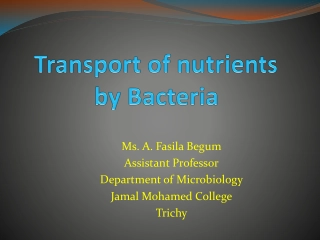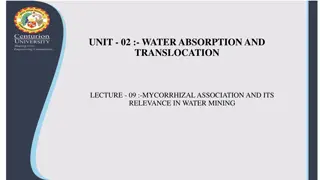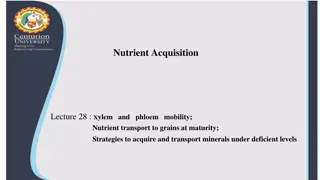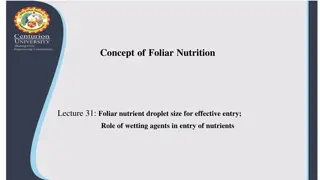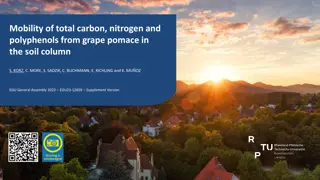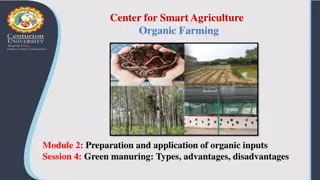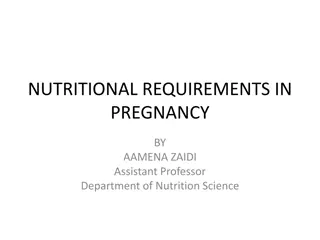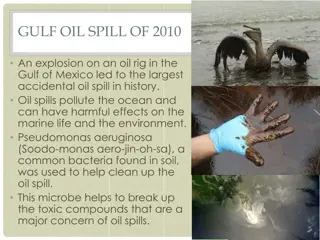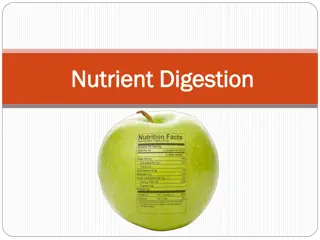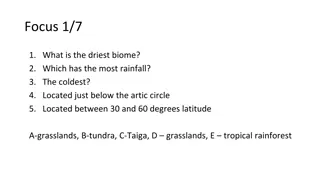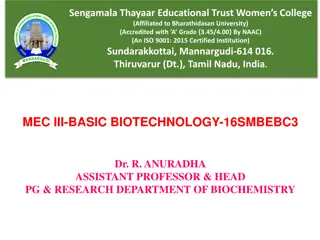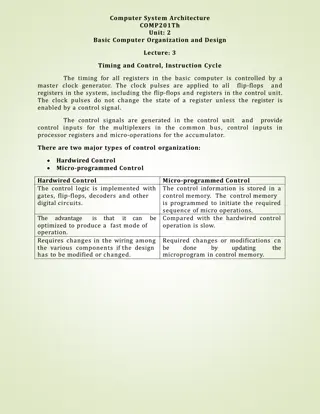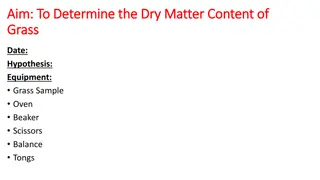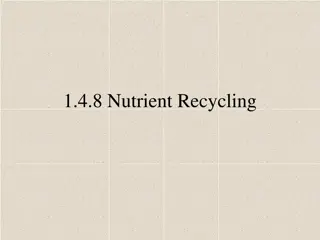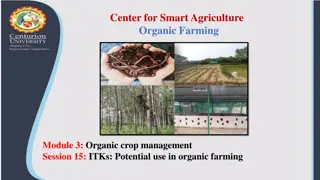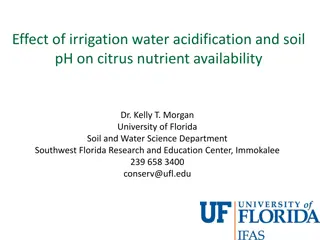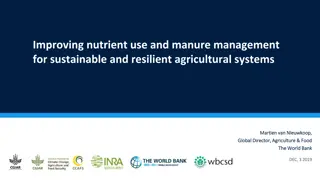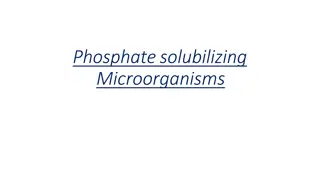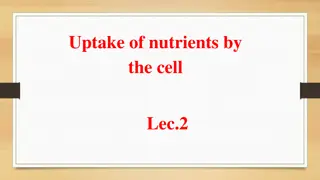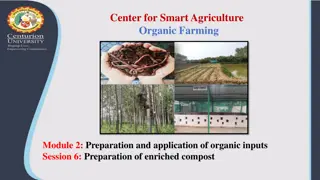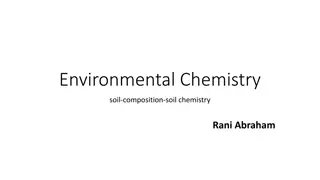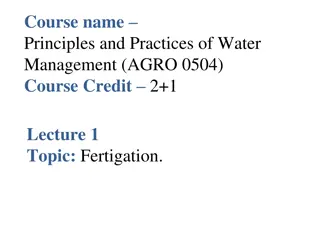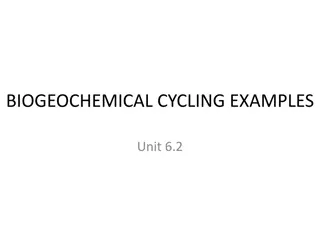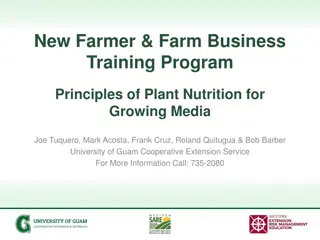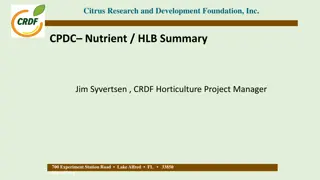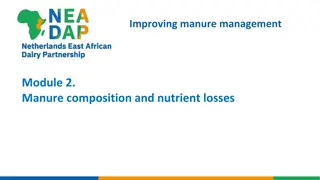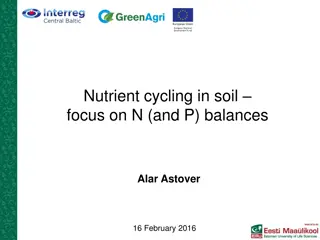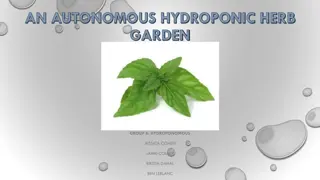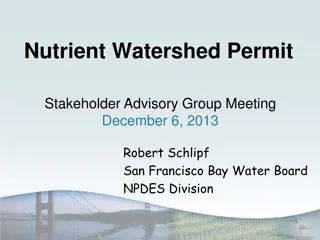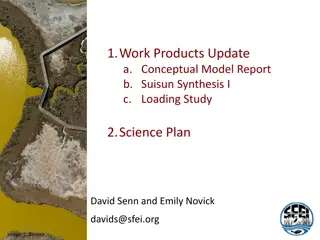Nutrient Uptake in Bacteria: Mechanisms and Factors
The process of nutrient uptake in bacteria, including the role of macronutrients, micronutrients, and environmental factors. Learn about the different mechanisms of nutrient transport and the importance of selective permeability in plasma membranes.
0 views • 25 slides
Pest control in Kolkata
Are you looking for professional pest control services in Kolkata? Socspl.com is here to provide the most reliable and efficient pest control services in Kolkata. We have extensive knowledge and experience in handling all kinds of pest infestations such as termite control, cockroach control, ant con
1 views • 8 slides
Mycorrhizal Association and Its Importance in Water Mining
Mycorrhizal association plays a crucial role in facilitating nutrient and water absorption for plants through a symbiotic relationship with fungi. This relationship enhances the plant's ability to acquire minerals from the soil while providing essential compounds to the fungi. The mycorrhizal associ
4 views • 6 slides
Nutrient Acquisition
Plants utilize xylem and phloem to transport water, nutrients, and minerals throughout their structures. Xylem moves water and mineral salts from roots to leaves, while phloem transports sugars and amino acids from leaves to the rest of the plant. Nutrient acquisition involves passive and active tra
2 views • 6 slides
Concept of Foliar Nutrition
Explore the crucial concepts of foliar nutrition, including the role of droplet size in nutrient entry and the importance of wetting agents in optimizing nutrient absorption in plants. Discover how smaller droplets enhance efficiency while avoiding drift, and how wetting agents facilitate water upta
0 views • 8 slides
Grape Pomace Utilization in Soil Nutrient Management Study
Study on the mobility of total carbon, nitrogen, and polyphenols from grape pomace in soil columns, focusing on its relevance as an organic fertilizer rich in nutrients. The research also highlights the industrial potential of grape pomace, nutrient mobility between varieties, and methods used for c
1 views • 14 slides
Understanding Green Manuring in Organic Farming: Types, Advantages, and Disadvantages
Green manuring involves incorporating green plant tissues into the soil to enhance fertility and structure. This method includes types like in-situ and green leaf manuring. Desirable qualities of a good green manuring crop are quick growth, nutrient fixation, and deep root systems. Advantages includ
0 views • 7 slides
Understanding Nutritional Requirements in Pregnancy by Aamena Zaidi
Adequate nutrition before and during pregnancy is crucial for long-term maternal and fetal health. Maternal health is influenced by genetic, social, and economic factors, impacting physiological adaptations for better nutrient utilization. Physiological changes in pregnancy include increased total p
0 views • 41 slides
The Role of Soil Microbes in Nutrient Recycling
Soil microbes such as bacteria, protozoa, and nematodes play a crucial role in nutrient recycling by breaking down organic matter, releasing nutrients for plant growth, and aiding in the decomposition process. These microscopic organisms help maintain soil health and ecosystem balance, highlighting
0 views • 16 slides
Understanding Nutrient Digestion and Absorption Process
Nutrients in food provide essential materials and energy for our body to function. During digestion, large molecules are broken down into smaller pieces for absorption. Enzymes play a crucial role in this breakdown process, with each enzyme being specific to a certain type of nutrient. Carbohydrates
1 views • 14 slides
Exploring Tropical Rainforests: A Diverse and Vital Ecosystem
Tropical rainforests, found near the equator, boast immense biodiversity and play crucial roles in regulating global climate and nutrient cycles. These forests thrive in humid, warm conditions with ample sunlight. Nutrients are primarily found in plants rather than the soil, and their efficient nutr
0 views • 27 slides
Understanding Blue-Green Algae: Cultivation, Nutrient Composition, and Properties
Blue-green algae, also known as cyanobacteria, are photosynthetic bacteria that thrive in warm, nutrient-rich water bodies. They are packed with essential nutrients like vitamins, minerals, and amino acids, making them a valuable resource for overall health. Learn about the cultivation, uses, and hi
1 views • 21 slides
Processor Control Unit and ALU Implementation Overview
In Chapter 4, the processor's control unit and ALU are detailed in a simple implementation scheme. The ALU performs operations based on opcode values, while the control unit provides signals for various functions such as load/store, compare, and branch. Decoding techniques and control signal generat
1 views • 21 slides
Asian Pest Control - Professional Pest Management Services in Dhaka
Asian Pest Control offers top-quality pest control services in Dhaka, with a mission to be recognized as the best in the industry. Their highly trained professionals prioritize safety and environmental care while providing services like cockroach control, rodent control, snake repellent, lizard cont
1 views • 16 slides
Basic Computer Organization and Design - Timing and Control
The timing of all registers in a basic computer is governed by a master clock generator, with clock pulses controlling the flip-flops and registers in the system. Two main types of control organization are Hardwired Control and Micro-programmed Control. The former uses digital circuitry like gates a
1 views • 4 slides
Determining Dry Matter Content of Grass: A Comprehensive Study
The study aims to determine the dry matter content of grass using a detailed method involving sample preparation, oven drying, and calculations. By following the outlined procedure, the dry matter percentage of grass samples can be accurately measured, providing valuable insights into nutrient compo
5 views • 5 slides
Nutrient Recycling in Ecosystems
Nutrient recycling in ecosystems involves the continuous breakdown and exchange of elements between living and non-living components, ensuring sustainability and no long-term drain on Earth's nutrients. This process includes decomposition of organic material by bacteria and fungi, uptake of nutrient
1 views • 23 slides
Indigenous Technical Knowledge in Organic Farming: Sustainable Practices and Nutrient Management
Indigenous Technical Knowledge (ITK) plays a crucial role in organic farming by providing sustainable practices passed down through generations. Farmers in regions like Orissa, West Bengal, Tamil Nadu, and Rajasthan utilize ITK for nutrient management, intercropping, green manuring, and addressing a
0 views • 8 slides
Understanding Citrus Nutrient Availability in Relation to Soil pH and Irrigation Water Acidification
This research by Dr. Kelly T. Morgan from the University of Florida explores the impact of soil pH, irrigation water acidification, and nutrient recommendations on citrus trees affected by HLB disease. The study examines the availability of key nutrients such as Mn and Zn, the effects of different s
0 views • 23 slides
Enhancing Nutrient Efficiency in Agriculture for Sustainable Systems
Improved nutrient use and manure management are crucial for sustainable agricultural systems. Efforts to increase nutrient efficiency through better practices can help reduce emissions and aquatic pollution. Public awareness, policy realignment, and soil data quality enhancements are key areas for p
0 views • 14 slides
Harnessing Phosphate-Solubilizing Microorganisms for Sustainable Crop Growth
Phosphorus is crucial for plant growth, but its availability is often limited due to insoluble forms in soil. The use of phosphate-solubilizing microorganisms (PSMs) can help convert insoluble phosphorus into a usable form for plants. This process involves isolating, screening, and mass-producing PS
0 views • 6 slides
Mechanisms of Nutrient Uptake by Microbial Cells
Nutrient uptake by microbial cells involves various transport mechanisms such as passive diffusion, facilitated diffusion, active transport, and group translocation. These mechanisms ensure the specific acquisition of required nutrients by the cell through the selectively permeable plasma membrane.
3 views • 15 slides
Enhancing Compost Quality for Organic Farming: Phosphorous-Enriched Compost Preparation
Composting is a natural process crucial for organic farming. Enriched compost improves nutrient supply to crops. Learn how to prepare phosphorous-enriched compost using organic wastes, bio-inoculants, and rock phosphate. Follow a method involving layering organic materials, cow dung, and rock phosph
3 views • 8 slides
Understanding Soil Chemistry and Redox Reactions in Environmental Chemistry
Soil chemistry plays a crucial role in sustaining healthy soils by influencing nutrient availability through oxidation and reduction processes. Redox reactions in soil are impacted by factors like oxygen content and water presence, affecting nutrient supplies. The redox status of soil reflects its n
1 views • 92 slides
Principles and Practices of Water Management: Fertigation System Overview
Fertigation, a fusion of "fertilizer" and "irrigation," revolutionizes crop cultivation by delivering complete fertilizer solutions to root zones through drip irrigation systems. This method, crucial in controlled environments like greenhouses and polyhouses, requires specific infrastructure, clean
0 views • 10 slides
Understanding Nutrient Pollution and Its Impact on the Environment
Nutrient pollution, characterized by the excess input of nitrogen and phosphorus into water and air, is a significant environmental issue with far-reaching consequences. It can lead to toxic algae blooms, dead zones, economic losses, and adverse effects on human health. The causes of nutrient pollut
2 views • 11 slides
Understanding Marketing Control and Its Importance in Business
Marketing control is a crucial process for firms to evaluate the impact of their marketing strategies and initiatives, making necessary adjustments for better outcomes. It involves various aspects such as annual plan control, profitability control, efficiency control, and strategic control. The proc
0 views • 20 slides
Essential Principles of Plant Nutrition for New Farmers
Gain insights on the basic components of soil, essential soil-based plant nutrients, Liebig's Law of the Minimum Nutrient Balance, and modern nutrient management practices. Learn the importance of feeding the soil to ensure optimal plant growth and productivity in farming business training programs.
0 views • 12 slides
European Standards for Plant Biostimulants Development
The European Committee for Standardization (CEN) plays a crucial role in developing European standards for plant biostimulants, focusing on improving plant nutrition processes independently of nutrient content. The CEN/TC.455 committee is responsible for creating standards supporting the EU Fertilis
2 views • 5 slides
Understanding Control Plans in Process Management
A Control Plan is vital in controlling risks identified in the FMEA process, focusing on process and product characteristics, customer requirements, and establishing reaction plans for out-of-control conditions. It serves as a central document for communicating control methods and includes key infor
1 views • 20 slides
Citrus Research and Development Foundation Nutrient Summary
The Citrus Research and Development Foundation (CRDF) in Lake Alfred, FL, conducted research on nutrient management and Huanglongbing (HLB) in citrus trees. Various studies focused on nutrition, root health, vector control, and tree productivity to combat citrus disease. Analysis of foliar ENP appli
0 views • 11 slides
Nutrient Criteria Development Plan for High Rock Lake Summary Update
Nutrient Criteria Development in North Carolina has evolved through various stages since 2001, with the key milestones being the development of the Nutrient Criteria Implementation Plan in 2004 and the Nutrient Criteria Development Plan in 2014. The plan aims to link nutrient concentrations with the
0 views • 8 slides
Iowa Nutrient Pollution Control Measures and Strategies
Gulf Restoration Network Decision, sources of Nutrients Nitrogen (N) and Phosphorus (P), impacts of Nutrient Pollution leading to Algae Blooms and Gulf Hypoxia (Dead Zone), measures to reduce Non-Point Source (NPS) contamination, EPA's current strategy, and Iowa's approach with its Nutrient Reductio
0 views • 20 slides
Understanding Manure Management: Compositions, Nutrient Losses, and Factors
Explore the complexities of manure management by delving into manure compositions, nutrient losses, and the various factors influencing the quality and quantity of manure. Learn about the impact of animal species, diets, and management practices on manure characteristics, as well as strategies to mi
0 views • 29 slides
Understanding Nutrient Cycling in Soil for Sustainable Agriculture
Explore the intricate processes of nutrient cycling in soil, with a focus on nitrogen (N) and phosphorus (P) balances. Discover the various inputs and outputs considered within different scales, from field to country level. Gain insights into the importance of interpreting data correctly and the imp
0 views • 22 slides
Autonomous Hydroponic Herb Garden Group 6 Overview
An autonomous hydroponic herb garden designed by a group of six individuals aims to provide a fully automated, countertop solution for urban herb cultivation. The system utilizes hydroponic techniques, such as the Nutrient Film Technique (NFT), to optimize plant growth while minimizing water usage a
0 views • 20 slides
Nutrient Watershed Permit Stakeholder Advisory Group Meeting Overview
The Nutrient Watershed Permit Stakeholder Advisory Group Meeting on December 6, 2013, discussed permit components, effluent monitoring, annual reporting, treatment optimization, nutrient studies, monitoring, reporting, support for nutrient studies, treatment plant optimization, and permit timeline.
0 views • 6 slides
Nutrient Conceptual Model Review Summary
Comments and feedback on a Nutrient Conceptual Model report include suggestions to address issues related to eutrophication concepts, nutrient stoichiometry, community composition, and nutrient reduction goals. Recommendations also focus on incorporating flushing/residence time discussions, predicti
0 views • 9 slides
Effective Regulation of Active Power in Renewable Energy Sources
The balance between generation and load is crucial in power systems operation. Various control levels ensure this balance, from frequency control to power station planning. DER units may lack control means, but specific configurations allow for frequency and voltage control. Performance indicators a
0 views • 51 slides
Understanding Control Plans in Process Management
Control plans are essential tools for managing process risks and ensuring quality control. They focus on controlling process and product characteristics, meeting customer requirements, and having reaction plans in place. A control plan contains key information such as control factors, specifications
0 views • 20 slides
